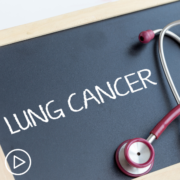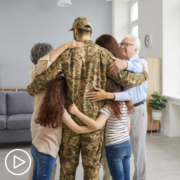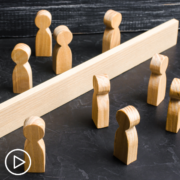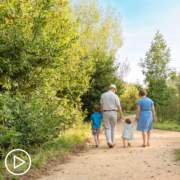Do Disparities Exist for Black and Latinx Veterans Facing Lung Cancer?
Do Disparities Exist for Black and Latinx Veterans Facing Lung Cancer? from Patient Empowerment Network on Vimeo.
Do Black and Latinx veterans face lung cancer disparities? Expert Dr. Michael Kelley from Duke University School of Medicine discusses past and current health outcome disparities and comparisons of molecular genetic alterations between Black and white veterans.
[ACT]IVATION TIP
“…if you are experiencing a challenge in working with the VA healthcare system, regardless of what community you are in, please communicate that to someone at the VA. That could be your provider, that could be the patient advocate. Every VA hospital has a patient advocate or that could be someone else at the medical center. We want to know how we can help you in what problems you’re experiencing.”
Download Resource Guide | Descargar guía de recursos
See More from [ACT]IVATED NSCLC Veterans
Related Resources:

Equitable Access: Overcoming Challenges in Precision Medicine for Veterans with Lung Cancer |

|

Navigating Lung Cancer Clinical Trials: VA Support and Resources for Veterans |
Transcript:
Lisa Hatfield:
Dr. Kelley, what specific challenges do veterans from the Black and Latinx communities face when trying to access lung cancer healthcare services?
Dr. Michael Kelley:
So in VA, there are several different ethnic and racial populations, and we’ve looked at the outcomes of Black and white veterans. Latinx veteran population is still relatively small, so we don’t have good statistical power to be able to draw strong conclusions there. But the comparison between Black and white is very clear in VA in lung cancer in terms of the outcomes.
And the result is, is that Black veterans do just as well, or better than white veterans at every stage of lung cancer. That is quite different than it is in the rest of the country. So that is one area that I think VA as an integrated healthcare system with wraparound services is able to brag about that we are able to provide all the care that is necessary to derive that outcome.
That wasn’t always the case. In the early 2000s, there was a difference in surgery rates for Black veterans with early stage lung cancer. And we were studying this, and what we saw was that, that difference went away about 2009 or 2010, and it hasn’t come back since we last looked at it. We don’t know what caused it, and we don’t know why it went away, but we’re glad to see it did go away. There are a long list of other possible challenges that veterans in Black or Latinx communities might face. These may be overlapping with those that everyone faces, but VA probably has a service to help with it.
And so my activation tip for you is, is that if you are experiencing a challenge in working with the VA healthcare system, regardless of what community you are in, please communicate that to someone at the VA. That could be your provider, that could be the patient advocate. Every VA hospital has a patient advocate or that could be someone else at the medical center. We want to know how we can help you in what problems you’re experiencing.
Lisa Hatfield:
Are there any differences in the characteristics of the cancer for these populations for the Black and Latinx communities that you have seen?
Dr. Michael Kelley:
We have looked at a lot of comparisons between Black and white groups of veterans, not so much around Latinx because of the smaller numbers. There are not a lot of differences in terms of molecular genetic alterations. And so there are some differences in the geography. So the Black African Americans veterans tend to live more in the Southeast, where actually there’s the largest collection of military veterans who are enrolled in VA care anyways.
But in terms of the outcomes, we don’t really see any outcomes. There are some other differences in medical care that are appropriate, such as a variation of normal in terms of the white blood cell count that happens in some individuals predominantly in of African descent. And those individuals might be at risk for having their chemotherapy doses reduced, because their white count goes down more than other individuals. But in general, we don’t see a lot of differences between those populations medically.
Share Your Feedback
Create your own user feedback survey






